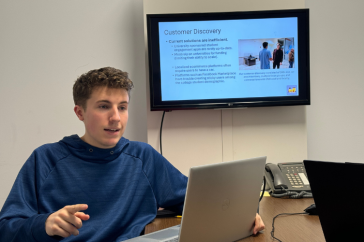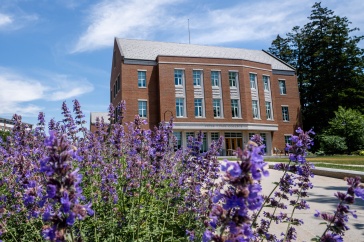
The UNH Peter T. Paul College of Business and Economics opened its doors in 2013 and brought with excting changes and growth for the schools business and economics curriculum. Photo by Scott Ripley
There was a lot of excitement around campus in the spring of 2013 when the Peter T. Paul College of Business and Economics opened its doors and forever changed the University of New Hampshire’s business program.
While the new building immediately expanded the capacity of the school’s business and economics programs from 1,700 to 2,800 students and provided a significant technological upgrade, it also meant leaving behind the Whittemore School of Business and Economics, known as WSBE and housed at the McConnell Hall, which already had a strong and established reputation.
Business and economics students at the time remember a mixture of apprehension and excitement as they had the opportunity to witness the end of one legacy and the dawn of another.
Looking Back At WSBE
Sean Stewart ’13 ‘G19, got to see WSBE and Paul from different perspectives. He attended the Whittemore School as an undergraduate, majoring in business administration with concentrations in marketing, international business and economics, and experienced Paul College as a graduate student and staff member.
“I enjoyed WSBE. The faculty was great and WSBE had a strong reputation in the area,” Stewart says. “Being in McConnell Hall we just did a lot with less. The building didn’t provide a lot of opportunities for hanging out outside of class, but we still found ways outside the building to connect.”
Stewart, who currently works as a senior manager of performance marketing analytics at VTS, recalls freshmen cramming into the old McConnell computer lab for exams and project submissions, as well as the small “reading room” that was the unofficial gathering space.
“The reading room was iconic. It was a small space. I’d compare it to three or four Paul breakout rooms combined. There were just some tables and chairs thrown together. It was nothing fancy, but there were always people in there,” he says. “Thinking about the computer lab makes me laugh. Just the fact we even had a computer lab speaks to it being a different time.”
While there were rumblings about a new business school when Cole Jaillet ’14 came to UNH, he made his decision based on WSBE.
“WSBE had a good curriculum, it would still stand the test of time now, although Paul has come leaps and bounds from what WSBE was, but it was still pretty good,” Jaillet says. “The thing that stands out most is the school itself; the physical aspect of the school did not match the curriculum.”
Even though most students were ready for a new building, Cole’s future wife Samantha Raymond ’16 (now Samantha Jaillet), said there was some uncertainty about the name change from Whittemore to Paul and how that would impact student job prospects.
“WSBE was held in such high regard and when I applied for jobs out of school people were like ‘What do you mean by Paul?’ so I started to put on my resume ‘formerly Whittemore,’” Samantha Jaillet says. “Now it’s very different, Paul has its own reputation.”
Emily Lohr ‘15 ’G16 recalls the same apprehensions at the time and is amazed at how quickly things have changed.
“I’m seeing the name (Paul College) everywhere, which is really cool,” Lohr says. “There was some uncertainty in the beginning, but it has clearly blossomed into something fantastic.”
Lohr, who currently works as a tax senior manager at PwC, said the one thing that never changed during the transition between schools was the quality of the faculty.
“I think the best part of the business school has always been the professors,” Lohr says. “The professors were plucked from WSBE, dropped off at Paul, and we all got to learn in a nicer environment.”
Promoting An Environment of Collaboration
Mikaela Mikolaities ’15 spent her initial semesters in the business program at WSBE and her biggest complaint was that McConnell Hall was not conducive to group work. That all changed when Paul opened her junior year.
“Just the overall layout was a huge change. It was so much more open than McConnell,” Mikolaities says. “It had more common space to do work, not just the breakout rooms but on the first floor. It had a way more collaborative vibe, which was important because of group work and collaborative projects the courses required.”
As Paul opened, Summer Olson ’15 assumed a leadership role in the UNH Marketing and Advertising Club (MAC). At that time, the club was struggling to find its footing, Olson recalled. Fortunately, the club benefited from the new student activity space and upgraded technology to make presentations and host events.
The additional space and technology played a role in starting the annual Summit for Marketing and Advertising Careers (MAC SMAC), which brings together students and industry leaders to learn about trends, careers and opportunities. MAC SMAC remains a premiere event today. Olson said the new space helped the club present itself more professionally and ushered in a new era.
“It’s pretty fulfilling and rewarding for my friends and me to see how the organization has taken off,” Olson said. “I don’t want to attribute it all to the new space, but I do think it gave our student organizations a stronger reputation of being professional and organized, which helped to get businesses excited in investing in these groups.”
Olson is currently an instructor for the Paul College Business in Practice (BiP) program, teaching a course about job search optimization and interview tactics. She works full-time as a senior talent acquisition specialist at Softworld.
As a staff member at Paul, Stewart worked as a program coordinator, managing the First-year Innovation and Research Experience (FIRE) and Paul Scholar programs, before becoming the assistant director of undergraduate programs. He said having these programs at Paul College took the business school’s reputation of promoting collaborative learning experiences to a new level.
“I got to be a part of some amazing initiatives that have laid the foundation for the Paul College experience with FIRE and the level of students that we have in the Paul Scholars program,” Stewart says. “I don’t know if that ever would’ve happened in the old building. I just don’t think it would have been able to be supported.”

Paul Pride
Cole Jaillet says he associates the opening of Paul College with himself getting on track and solidifying his major in marketing and entrepreneurial studies.
“With the new building the opportunities and programs really started to take shape,” Cole says. “I found it difficult my first two years to latch on to something that I was passionate about. When that flip to Paul occurred, I started to get involved in the entrepreneurship side through the Holloway Competition. I also became involved in what has become the Rines Angel Fund … the curriculum started to click for me.”
Samantha Jaillet recalls students wanting to be at Paul and taking pride in the building. She became actively involved at the new school, serving as a dean’s ambassador, academic advisor, teaching assistant and research assistant.
“As a finance student, it was nice to have those extra rooms at Paul for finance meetings. It was leaps and bounds better than my first semester (at WSBE). Samantha says. “It seemed like students were invested in the new school and wanted themselves to be a reflection of it and started to invest in themselves a little more.”
Cole Jaillet currently serves as director of product at Passport, while Samantha Jaillet works as a buyer for the TJX Companies.
Mikolaities studied economics and eco-gastronomy and credits her Paul College experience with guiding her down her career path in the wine industry.
“I think it was helpful to have those connections in college through the hospitality management program that I don't think I would’ve necessarily had at a different school,” she says.
Mikolaities is a regional manager at Bonterra Organic Estates.
Ironically, one of Mikolaities’ first distributor jobs involved selling Peter Paul Wines, among other brands.
“It was kind of cool, I got to have that selling story of I went to this school, and I’ve actually met Peter Paul,” she says. “It was cool to go to business school and end up in a field where Peter Paul is a big investor within that space. I thought it was an interesting opportunity to blend my college life into my adult life.”
While gradual at first, Stewart says alumni from both WSBE and Paul College have come together well to give back and help continue to push the business and economics curriculum at UNH forward.
“It’s great to see us make an impact on a national level, recruiting students from across the country and the world,” he says. “It was cool to witness and be a part of the expansion of what it meant to be a UNH business student.”
-
Written By:
Aaron Sanborn | UNH Paul College & CHHS | aaron.sanborn@unh.edu
















































